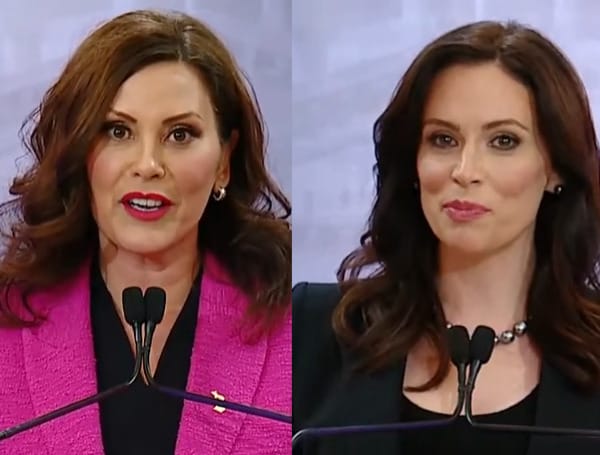Democratic Gov. Gretchen Whitmer of Michigan and Republican candidate Tudor Dixon debated in the second and final gubernatorial debate of the state’s election on Tuesday, with abortion, parental rights in education and inflation being the debate’s top themes.
The very first question of the debate centered around Ballot Proposition 3, a measure to codify abortion rights in Michigan, which was supported by Whitmer.
“We have an opportunity to enshrine Roe into law by supporting Proposition 3,” Whitmer said. She accused Dixon of claiming that raped women should be required “to carry a child to term.”
Dixon, by contrast, opposed the measure, claiming that it would “allow abortion up until the moment of birth” and allow “non-licensed professionals” to perform an abortion, making it the “most radical law in the entire country.” She said that it wouldn’t enshrine Roe into law, stating that “the people should decide what they want to do” about abortion, rather than making it a permanent part of the state’s constitution.
However, Dixon, when pressed, said that she would abide by Proposition 3 if it was approved by a majority of Michigan voters. “If that’s what the people want, then I will enforce that.”
In the news: NYC Judge Tosses The Big Apple’s Vax Mandate Ordering Fired Resistors Back To Work
Nearly two weeks after the first debate, on Oct. 13, where the candidates sparred over the content of school curricula and its perceived focus on transgenderism and excessive sexuality, Dixon was quick to bring up the issue, again – which has been a prime line of argument for Republican candidates across the country.
“There is sexual content and pornography in schools,” Dixon claimed, stating that “textbooks are now literally describing how to have sex.”
“She has been silent on the issue,” Dixon said of Whitmer while stating that her own approach would involve “going back to the basics of reading, writing and math” and that she “stands with parents” in opposition to the new content. Whitmer, by contrast, accused Dixon of “trying to wedge communities between one another” with the issue.
“We have a duty to make sure that all children feel accepted,” she said while claiming that politicians need to leave the issue of curriculum content to local authorities and “bring down the temperature.” She also asked, rhetorically, “Do you believe that books are more dangerous than guns?” in a reference to Dixon’s opposition to certain gun restrictions, and claimed that Dixon was trying to use the issue to obscure the role of billionaire and former Secretary of Education Betsy DeVos, a Dixon backer, in the campaign.
On inflation, which voters across many surveys have listed as among their top concerns, Whitmer touted her claimed achievements of increasing access “to free and low-cost daycare,” thereby purportedly reducing costs for families. She also took credit for a gas tax holiday and ending levies on retirement benefits for seniors.
Dixon, meanwhile, pointed out that Whitmer vetoed several tax reductions proposed by the Republican-controlled state Legislature in Lansing. “She’s actually vetoed quite a bit of opportunity: the child tax credit, an income tax reduction, and reduction of levies on retirement income,” while adding that Whitmer planned to raise the gas tax by 45 cents, which was voted down by the Legislature.
Whitmer countered that the measures Dixon cited “were a gimmick” and “wouldn’t take effect until spring of 2023.” In response, Dixon accused Whitmer of hypocrisy, reminding voters of Whitmer’s pledge that “she can work with anyone on anything … but now [she claims] that GOP bills are a gimmick.”
The candidates also debated the issues of COVID-19 lockdowns and infrastructure plans, including road construction and Enbridge Line 5, a gas pipeline across the Straits of Mackinac, with both issues centering around Whitmer’s policies on the files as governor.
Polls have shown Whitmer and Dixon locked in a tight race with each other. In a recent poll by the Trafalgar Group, Dixon received 47.9% support while Whitmer received 48.4%, a difference of 0.5%, making them statistically tied.
Absentee voting has already begun in Michigan, while voters will go to the polls on Nov. 8.
Visit Tampafp.com for Politics, Sports, and National Headlines. Support journalism by clicking here to our GiveSendGo or sign up for our free newsletter by clicking here.
Android Users, Click Here To Download The Free Press App And Never Miss A Story. Follow Us On Facebook Here Or Twitter Here.
Copyright 2022 The Free Press, LLC, tampafp.com. All rights reserved. This material may not be published, broadcast, rewritten, or redistributed.

